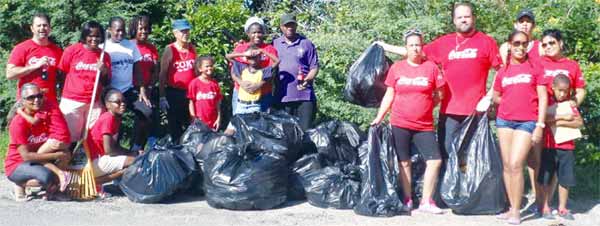A group of young people took to Pigeon Point beach recently to undertake a mammoth task of trying to fix a problem which really should not exist in the first place.

The Caribbean Youth Environment Network (CYEN) – St. Lucia Chapter hosted the coastal cleanup. According to a press release sent to The VOICE by the group’s Press Relations Officer, Shana Marius of “The cleanup covered the area after the newly installed kids’ park to The Landings, and the rocks at the ocean front to Pigeon Island Park. CYEN collaborated with du BoulayBottling which was the main sponsor for the activity, and had the largest, non-CYEN member, group of volunteers.
The total of 43 volunteers also included members of the Saint Lucia National Trust, Lions Club of Castries, the Fisheries Department, Saint Lucia Scouts Association, and members from the Gros Islet community; were able to gather 77 bags of garbage from the selected area.
The type of trash collected was documented, and showed that plastic bottles, plastic bottle caps, and foam take-away containers made up the bulk of the garbage disposed of by the public. Among the trash collected there were car tyres, chiller, washing machine parts and other household appliances, beverage cans, and foam cups and plates.

CYEN urge the public to utilize the proper disposal of garbage in aid or conservation of coastal and marine environment which serve not only as an attraction and a place to relax but supplies a daily livelihood for people. They also all our government officials to provide proper monitoring and implementation of policies against littering, and to institute a means of reuse and recycling, especially for plastics.
In a bid to go more in depth on this issue, The VOICE reached out to a member of the Eastern Caribbean Divers team who shed some light on a part of the problem that many might be overlooking…the effect on marine life.
Diver Wendy John said the problem stretches far beyond the beaches as indiscriminate dumping of garbage in rivers and gutters add to the problem as well. As a result of this act, the local marine life is suffering and unbeknownst to us, we are killing ourselves in the process: “The pollution has various effects on our marine life. For instance, sea turtles eat jelly fish, with clear plastic bags, turtles mistake the bag for jelly fish and eat them, which suffocate and kills them. All garbage is harmful to the marine life and in many cases, causes death to the animals. Others find their way into the food that even we eat, as the water we pollute is where the fishermen go to get the fish for us to eat.”
She added that individuals littering are not the only culprits: “Pollution of the marine world does not only come as plastic and bottles, they come also as sediment being washed into the sea, from erosion due to the deforestation on hill sides and also toxic industrial waste products from factories and pesticides. All these can cause all sorts of harm to the reef which protects our shores.”
John said her passion for the sea leaves her in a real distressed state as she feels that St. Lucians are taking their privileges at the beaches for granted.
She said more effort needs to be placed on educating the nation about the importance of our beaches and marine life but most importantly, she believes that law enforcers need to start penalizing persons for their wrong doings.
“Many” she said; “have the illusion that the marine life will always be there and nothing will affect it and we cannot do much harm. This to me is shocking hearing people say this.”
John had one message to all those who contribute to the problem: “To the persons who pollute our waters, be it directly or indirectly, you need to see the long term damage this is causing and should discontinue from the detrimental practice before it comes back knocking on your door. Pollution indirectly and directly affects all of us one way or the other.”






![Simón Bolívar - Liberator of the Americas [Photo credit: Venezuelan Embassy]](https://thevoiceslu.com/wp-content/uploads/2025/12/Simon-Bolivar-feat-2-380x250.jpg)




What is growing on the bottom of Reduit Beach? A short way off shore the once pristine sand bottom is now covered with a weed mat fed by?? What!